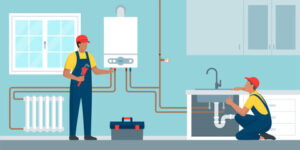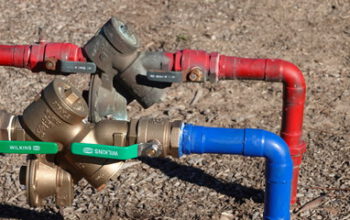Plumbing maintenance is the key to preventing expensive plumbing problems down the road. It’s also important for maintaining the quality of your water and reducing energy costs.
It only takes a few minutes to check under sinks for leaks and quickly unclog a drain or toilet. However, plumbing issues left unattended can lead to costly repairs and major damage to your home. To save time and money, click here at https://www.platinumplumbingsbc.com/.

Check For Leaks
A leaking water pipe can cause significant damage to your home. It can also be a health and safety hazard as it can lead to contaminated water supply. If you notice that your water meter is running even when nobody is using any water, there is probably a leak somewhere in the house. You can check this by taking a reading before and after turning off all the water use in your home. Then, check the meter again after several hours. If it has moved, there is a leak.
Identifying and fixing a leak early can help you save on your water bill, avoid costly damages to your property, and protect the environment. Some of the steps that you can take to check for a leak include checking around sinks, toilets, and water-using appliances for signs of dampness or musty smells. You can also pour a bucket of water down drains that are not used often to make sure that they are clear of blockages. If you cannot find the source of a leak, you can call a plumber.
It is also important to keep in mind that a plumbing leak can be hard to detect. The location of the leak opening may not be obvious to you, especially if the leak is underground or in an unfinished part of your home. This is one of the reasons why you should always rely on a professional to carry out plumbing maintenance and repair work in your home.
In addition to identifying and repairing leaks, plumbers can also handle clogs and other common plumbing problems. A clog can occur in any drain or pipe and is usually caused by excess food, hair, paper products, and other non-soluble materials being sent down the drain. If left untreated, a clog can grow into a serious issue that could require emergency plumbing services to resolve.
To remove a clog, it is important to first turn off the water supply to the fixture that is blocked. You can do this by turning off the main valve to your house or by locating and shutting off individual valves for each drain or appliance. It is also a good idea to locate all the water shut-offs in your home and test them regularly to ensure that they are working properly.
Unclog Slow Drains
Even the smallest blockages in your home’s drains can lead to significant plumbing problems if left untreated. These clogs are caused by soap, grease, and other debris that accumulate inside the pipes over time, making it difficult for water or waste to pass through them. The good news is that these minor obstructions often develop gradually and can be easily corrected with regular drain cleaning.
Before you invest in a store-bought drain cleaner, try this simple at-home recipe: First, pour 1/2 cup of baking soda down the drain. Then, pour 1/2 cup of vinegar over it. The chemical reaction will help break up clogs and leave your pipes clear. If you don’t have baking soda, try substituting it with lemon juice or apple cider vinegar.
Another great option is to use a wire snake, which can be purchased at most hardware stores. This tool has a long, flexible cable with aggressive tips for breaking up or hooking on to clogs and can be used to unclog toilets as well. When using a wire snake, it’s important to feed it slowly and carefully to avoid accidentally pushing the clog further down the pipe. If simple methods aren’t working, it may be time to call a professional plumber for more invasive drain cleaning.
While some clogs are caused by unavoidable circumstances, such as an overflowing toilet or tree roots infiltrating the sewer line, most are created by soap, hair, and other debris that can be easily avoided. Keeping your home clean, and disposing of unwanted items properly will help keep your drains clear all year round.
Remember those vinegar and baking soda volcano science experiments in elementary school? Put those skills to work! This is one of the simplest ways to unclog a drain. Simply pour 1/2 cup of baking soda down the drain, followed by 1/2 cup of white vinegar. Then, dump several cups of boiling water down the drain and let it sit for up to an hour. Once the clog is gone, flush the drain with hot water to clear away any remaining mixture.
Repair Broken Pipes
Broken pipes can be a serious emergency that requires professional plumbing services. However, if you’ve been keeping up with your plumbing maintenance and noticed the warning signs of a problem, such as dripping faucets, discolored water, or puddles under sinks, you can take steps to mitigate the damage until help arrives.
The first thing you should do if you suspect a pipe is broken is shut off the water supply to that area of your home. This can usually be done by finding the main water valve and turning it off, or by shutting off the valve at each fixture where a pipe runs. Once the water is turned off, you can use a mop or shop vacuum to remove any standing water and dry up any areas that may be affected by the leak.
For a quick fix, you can use epoxy putty to seal small holes or cracks in your pipe. This can be a cheap solution that will give you time to call in a plumber to make a permanent repair. If the problem isn’t a large one, you can also use duct tape to wrap the area around the break.
If you suspect a pipe is leaking from the inside, you can try to find it by looking for stains on the ceiling or walls in the room where the leak is occurring. You can also check your basement or crawlspace for any water stains or drips. If you can’t locate the leak, turn off the water to the house and then use a flashlight to inspect the area for a gap in the wall or floor. Be sure to switch off the power to any switches or outlets in that room before opening up the wall. Switch off the power to any electrical wires you may be working near and wear non-conductive gloves when handling any wiring or piping.
If you can’t locate the break, you might have to open up drywall or concrete to access the damaged pipe. If you have to cut through a wall, make sure to turn off the power to any switches or outlets in the vicinity and use a utility knife to score the surface of the drywall before cutting into it. Be very careful when you’re cutting into the wall to avoid hitting any pipe hangers or live electrical cables, and use a utility knife or keyhole saw to cut into studs.
Schedule Regular Inspections
Plumbing inspections are an essential part of keeping your home healthy and functional. They can help you identify potential issues, save money on repairs, and extend the lifespan of your plumbing fixtures and appliances.
When you choose a plumber to conduct your plumbing inspection, make sure that they are licensed and certified. They should have years of experience in the industry and be knowledgeable about all aspects of plumbing. Plumbing service providers also need to be up to date with the latest technology and trends in their field. This ensures that they can offer the best possible service to their customers.
During a plumbing inspection, the plumber will check all of your pipes for signs of damage and leaks. They will also test your water pressure to make sure that it is within the recommended range. They will also inspect your appliances, including the water heater and garbage disposal.
Leaking pipes are one of the most common plumbing problems, and they can lead to serious water damage if left untreated. Regular plumbing maintenance can prevent leaks and other problems from occurring, and it can also save you money on your water bill.
Plumbing inspections can also detect other issues, such as clogged drains, that can affect your health and well-being. Clogged drains can be caused by a variety of things, such as hair, soap scum, and food waste. A plumber can clear the blockage and restore your sink to normal working condition.
Many plumbing problems are hidden from view, such as a small crack in a pipe behind the wall or a dripping faucet that is easy to ignore. However, these issues can quickly escalate into major plumbing disasters that could cost you a lot of money in repairs and replacements. Regular plumbing inspections can spot these issues early so that you can get them fixed before they become worse.
A well-functioning plumbing system is essential for a comfortable and healthy living environment. Regular maintenance and plumbing inspections can prevent major problems from occurring, save you money on your energy and water bills, and extend the lifespan of your fixtures and appliances. So, don’t neglect your plumbing system – call your local plumber today to schedule an inspection!



